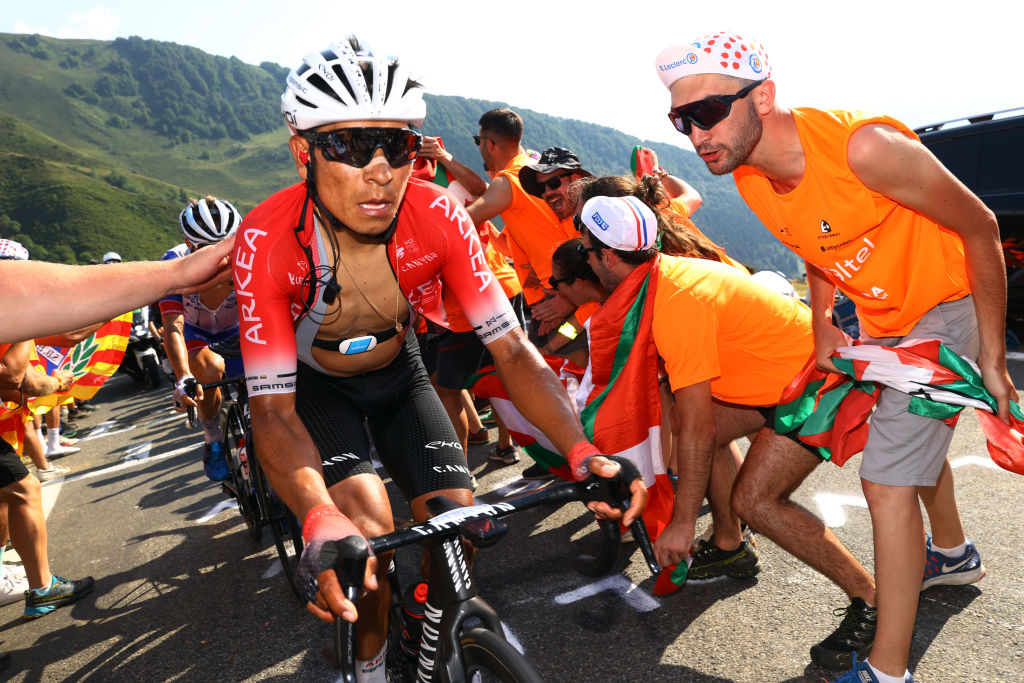Nairo Quintana again denies using tramadol as CAS confirms Tour de France disqualification
'I’ve had more than 300 doping controls and I’ve never had a problem with doping'

Nairo Quintana has continued to deny wrongdoing in his initial response to news that the Court of Arbitration of Sport had upheld the UCI’s decision to disqualify him from the 2022 Tour de France following his positive tests for the painkiller tramadol during the race.
The CAS verdict was announced on Thursday morning, ending Quintana’s hopes of having his 6th place finish at this year’s Tour restored. Quintana will not face a ban, as a first positive test for tramadol is considered an offence under the UCI Medical Rules but it does not constitute an anti-doping rule violation.
The UCI announced Quintana’s disqualification from the Tour just before the Vuelta a España, with the Colombian withdrawing on the eve of the race. Quintana had just agreed a contract extension with Arkéa-Samsic, but he subsequently parted ways with the French team, and he is still seeking a squad for next season.
In a video posted to Twitter on Wednesday, Quintana made his first public response to the binding CAS verdict.
“Unfortunately, it wasn’t good for me, I say that with sadness,” Quintana said. “But I can say with pride that, throughout my sporting career, I’ve had much more than 300 doping controls, which works out at more or less three doping controls per month, and I’ve never had a problem with doping. I have many reasons for not doing it [doping] and why I didn’t take that product [tramadol - ed.]”
Quintana signalled his intention to appeal the UCI sanction from the day it was announced in August, but he has not yet outlined his defence case in public.
“Unfortunately, this result has come out. Further ahead, I’ll comment on it and the whole situation, the day-by-day of the case, what happened and how we presented our defence. I’ll speak also about why CAS didn’t find that valid,” Quintana said.
Get The Leadout Newsletter
The latest race content, interviews, features, reviews and expert buying guides, direct to your inbox!
“It’s like that, my friends, life goes on and the storm has to pass. We still look ahead. I have a beautiful family. I have a country and great friends who support me. Many thanks for that and we’ll see each other soon.”
Quintana went on to suggest that he would speak in greater detail about the case at his Gran Fondo event in Medellin later this month. “We will talk about everything that has happened throughout my sporting life, what has happened during this process and the appeal I made to defend my innocence,” he said.
The 32-year-old tested positive for tramadol on two occasions during the 2022 Tour, following the summit finishes at La Planche des Belles Filles and the Col du Granon. The painkiller is not classified as a performance-enhancing drug but has been banned in competition by the UCI since March 2019.
Riders returning a positive result for the substance during a race via a blood droplet test are disqualified, while a second offence carries a five-month ban. WADA has recently announced that tramadol will become a banned substance from 2024.
Quintana’s lone competitive appearance since the case began came in Colombian colours at the World Championships in Wollongong, where he placed 66th. He is still without a contract for 2023, with both Astana Qazaqstan and AG2R Citroën denying rumours that he could race for them next season.
Primeras declaraciones de @NairoQuinCo sobre el dictamen del tribunal de arbitraje del deporte pic.twitter.com/D6IVTttIDENovember 3, 2022

Barry Ryan was Head of Features at Cyclingnews. He has covered professional cycling since 2010, reporting from the Tour de France, Giro d’Italia and events from Argentina to Japan. His writing has appeared in The Independent, Procycling and Cycling Plus. He is the author of The Ascent: Sean Kelly, Stephen Roche and the Rise of Irish Cycling’s Golden Generation, published by Gill Books.